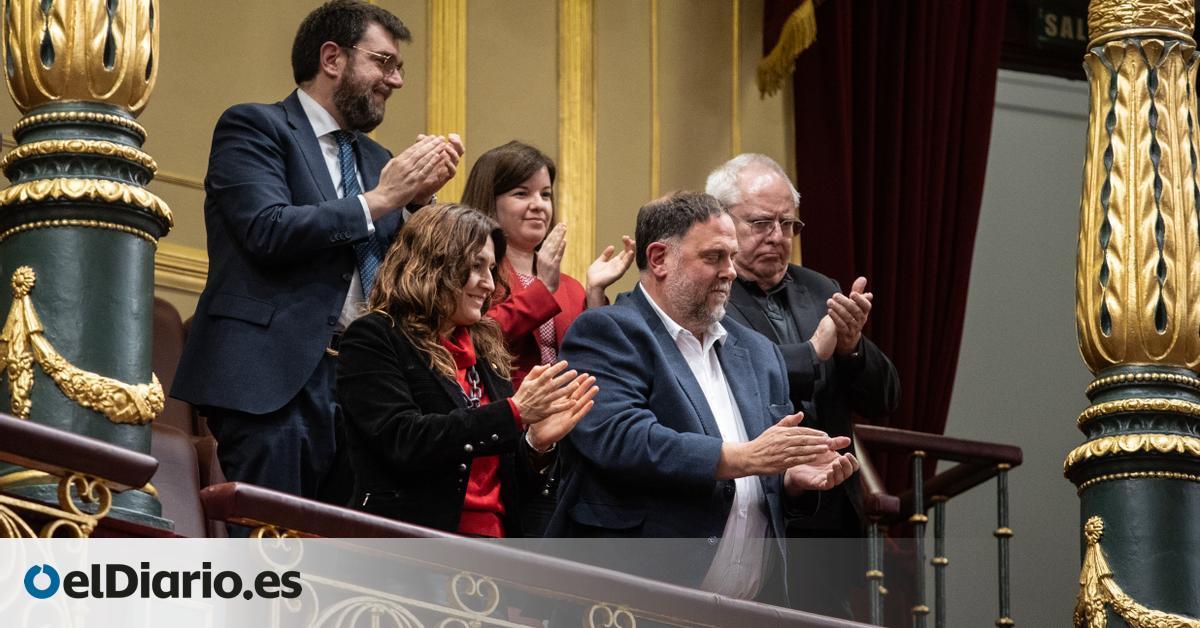
The PSOE always imagined that the day the amnesty was approved things would be substantially different from what happened this Thursday in Congress. In the middle of an atmosphere strained by the crossfire with the opposition due to the scandals of the ‘Koldo case’ and Isabel Díaz Ayuso’s partner, the green light for the measure of grace for those prosecuted by the process is not going to precipitate the political stability desired by Pedro Sánchez. At least, not imminently.
Because the anxieties of a legislature that has been going in fits and starts since the same night of 23J was added this week by the early elections in Catalonia. A key political episode for state governance that has already had a first consequence: there will be no General Budgets in 2024, as was the Executive’s intention.
The socialists, in private, point to the leader of Sumar and second vice president, Yolanda Díaz, whom they hold jointly responsible for the vote against the commons to the Generalitat accounts, the official trigger for the electoral advance. “She is not even capable of controlling her people,” they say in Ferraz. Those from Díaz reply, for their part, that they not only support the position of the Catalan coalition out of respect for their political autonomy but also because the megacasino project in dispute is an “aberration,” they consider, in ecological terms.
Pedro Sánchez, eager since the day of his inauguration to convey the idea of a long legislature despite the complex parliamentary majority that supports his Executive, gave the order this Wednesday to stop promoting the hypothesis of carrying out the Budgets of this year. A task that, as soon as Pere Aragonés pressed the election button, they considered “unrealistic” given the need to reach an agreement between ERC and Junts in the midst of the fight towards the polls.
“The logical and realistic thing is to work for the 2025 Budget,” said María Jesús Montero at the entrance to the plenary session of the amnesty vote after assuring the press that this setback, in her opinion, did not put the viability of the legislature. “The Budgets are extended, they are good Budgets, and the negotiations that we had advanced for this year’s accounts will serve as a basis for next year’s accounts,” she stated.
The opposition found in that last twist of the script the perfect perch to once again predict that Sánchez’s days are numbered. “This will be the first law of the legislature and the last,” Alberto Núñez Feijóo proclaimed from the tribune, referring to the amnesty. The socialist Patxi López, upon leaving the plenary session, contradicted him: “Of course there is stability, there are three and a half years of the legislature left.”
The key to this, in reality, lies with the parliamentary groups that support the coalition Executive. And judging by his reactions to the turbulence in Catalonia and the confirmation that there will be no Budget this year, Sánchez seems to have reason to still trust in a long term.
“We see the legislature as complex but no more than in 2021 or 2017,” said ERC Leader Oriol Junqueras at the doors of Congress, present in plenary during the parliamentary debate on the amnesty. Junqueras showed, in fact, the predisposition of his group to keep his hand extended to Pedro Sánchez beyond May 12. “Surely we can continue understanding with Sánchez if he is for people’s lives. What is relevant is that we make decisions that are useful for society and the economy,” he said.
Mertxe Aizpurua, the spokesperson for EH Bildu, another partner of the Government that also faces a momentous electoral event, the April 21 elections in Euskadi, expressed himself in a similar sense. “We would have liked to continue with the budget negotiation but we do not consider it a political drama either,” she expressed to send a message of continuity in collaboration with the Government.
The PNV also predicts that after the electoral debauchery of next spring, a certain political stability may finally emerge at the state level, regardless of the result of the Basque, Catalan and European elections on June 9. His parliamentary spokesman, Aitor Esteban, was understanding regarding Pedro Sánchez’s decision to postpone the negotiation of the accounts.
“I was already telling the Government that it had to ensure a sufficient majority before approving the project in the Council of Ministers, and negotiating with two parties that are in electoral conflict could have made things difficult. I understand the Government’s decision to postpone it to 2025, it was an alternative that could have been proposed from the beginning because the dynamics of Catalan politics are quite linked to that of the State,” he told the press this Thursday in Congress.
Esteban assured that he was confident in “resuming the conversations where they were.” “We had been talking for a month and a half. This last week we had brought our positions closer, it was not closed, there were things discussed and I hope that we will return to them at that point. The Government assures me that the agreements we have already reached will continue in the next negotiation,” he explained.
The big unknown, as always, will be to see Junts’ reaction to the result of the Catalan elections, to the formation of that Government based on the possible pacts and, furthermore, to the application of the amnesty law. Those of Carles Puigdemont are cautious when it comes to venturing where the shots of Pedro Sánchez’s legislature may go from next autumn, although officially they maintain their commitment to understanding based on the commitments acquired in the agreements with the PSOE.
In the Moncloa, meanwhile, they once again practice their well-exercised confidence that after it rains, it clears. The plans have not gone as they were designed just a week ago and the amnesty law has not yet given birth to the guarantee of a minimally sustainable legislature. And yet, the president’s team maintains intact their conviction that the succession of upcoming electoral curves will finally lead to something resembling calm.
Source: www.eldiario.es

